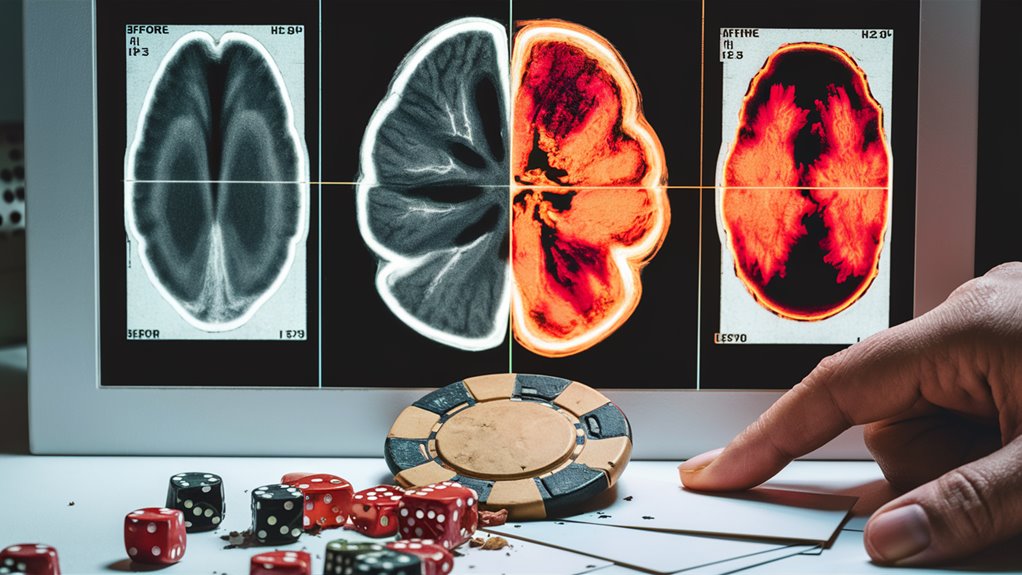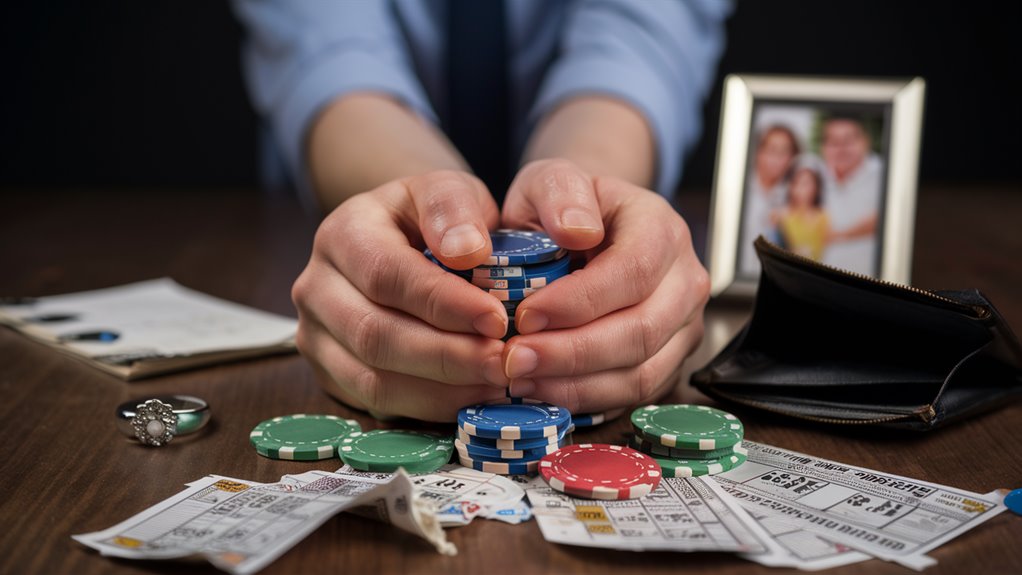The Real Deal on Gambling Addiction and Getting Better

What Gambling Addiction Looks Like
Gambling addiction is a real mental health issue that affects about 1% of adults globally. This problem is not just a bad trait or a lack of self-control – it’s a deep brain issue that interferes with how the brain functions and how a person behaves.
What Science Shows About Brain Changes
Studies reveal that severe gambling affects the brain’s pleasure paths, similar to drug addiction. This disrupts:
- Control over urges
- Strong need to continue gambling 먹튀검증 공식 추천 확인하기
- How dopamine functions in the brain
- Making smart decisions
How to Tackle Gambling Addiction
Getting over gambling addiction requires expert help, such as:
- Talking therapies
- Addiction counseling
- Group help meetings
- Advice on managing money
Signs and Dangers of Gambling Too Much
Clear signs of excessive gambling include:
- Betting more money
- Using money that isn’t yours
- Lying about gambling
- Trying and failing to stop
- Gambling to avoid problems
Making a Plan to Stop Gambling
A solid plan to quit gambling involves:
- Blocking gambling on your tech
- Tight control over your cash
- Building a support network
- New ways to handle stress
- Regular therapy attendance
Keeping It Up and Avoiding Gambling
To maintain progress, you must:
- Continue attending support groups
- Regular mental health checks
- Systems to manage finances responsibly
- Effective problem-solving methods
- Lifestyle changes to avoid triggers
Getting to Know Habit Gambling: Signs, Roots, and Official Measures
How Gambling Addiction Grows
Problem gambling often starts as recreational betting, gradually becoming a compulsive behavior.
The brain’s reward system becomes addicted to the excitement from gambling, similar to drug addiction.
This can turn casual fun into a serious gambling problem.
Main Signs of Gambling Too Much
Indicators of a potential gambling issue include:
- Spending essential funds on bets
- Lying about gambling frequency or amount
- Obsessive thoughts about gambling
- Chasing losses with larger bets
- Repeated unsuccessful attempts to quit
Figuring Out and Naming the Problem
The official guide (DSM-5) defines clear criteria for diagnosing gambling issues, requiring four or more signs within 12 months.
Risks include:
- Significant mood swings
- Financial instability
- Deteriorating relationships
- Uncontrollable betting habits
The Brain Science Behind Gambling Addiction
Research confirms that deep-rooted gambling activates the same brain areas as drug addiction, especially in parts that handle rewards and decision-making.
This neurological link explains why gambling addiction resists standard interventions.
Signs and Dangers to Watch For
Problem gambling exhibits several clear warning signs.
Key indicators include:
- Constant thoughts of gambling
- Need to wager more money for the same thrill
- Repeated failures to cut back or stop
- Using gambling to cope with life’s issues
- Concealing or lying about gambling habits
- Endangering jobs and relationships
What Increases the Risk
Innate Factors
- Family history of addiction
- Impulsive tendencies
- Brain alterations affecting rewards
- Risk-taking personality
Environmental Factors
- Early exposure to gambling
- Peer pressure
- Access to gambling venues and online platforms
- Financial instability
Most at Risk
- Young men
- Individuals with mental health issues
- People under stress or with past trauma
- Those without support networks
How Being Addicted Changes Your Brain

What Gambling Addiction Does to the Brain
Excessive gambling profoundly alters brain structure and function through changes in important pleasure pathways.
The brain’s natural reward system is hijacked, causing substantial dopamine releases, and rewiring neural pathways.
This mirrors how drug addiction forms, requiring increasing gambling for the same pleasure.
Changes in the Brain’s Structure
Brain scans of gambling addicts show less activity in the brain’s frontal region, which is responsible for impulse control and decision-making.
This diminished activity sheds light on why people continue to gamble despite adverse consequences.
The amygdala, involved in urge control, becomes overactive, intensifying cravings and withdrawal symptoms when not gambling.
Getting Better and Fixing the Brain
The brain’s adaptability (neural plasticity) allows recovery through appropriate interventions.
Stopping gambling and evidence-based treatments can gradually normalize brain functions.
Talking therapies restore cognitive functioning, while certain medications help stabilize dopamine levels.
The brain’s resilience allows positive changes to replace negative habits, albeit requiring sustained effort and time.
Ending the Gambling Cycle: Your Full Guide to Recovery
Understanding the Addiction Cycle
Compulsive gambling follows a predictable pattern that entraps individuals in harmful routines.
This cycle typically includes emotional triggers, urges to gamble, gambling actions, financial losses, and feelings of shame, creating a self-perpetuating loop.
Finding and Handling Triggers
Emotional triggers for gambling frequently involve:
- Financial concerns
- Feelings of isolation or loneliness
- Work-related stress
- Personal relationship issues
Developing healthy coping strategies like mindfulness, physical exercise, or creative outlets can replace gambling activities.
Setting Up Barriers
Essential Steps to Prevent Gambling
- Avoiding gambling venues and online sites
- Blocking access to betting apps and websites
- Implementing financial controls with family assistance
- Altering daily routines to circumvent tempting environments
Getting Better With Different Ways
Expert Help
- Talking therapies
- Group counseling
- Financial advisory services
- Consultations with addiction specialists
Building New Habits
- Learning stress management
- Forming new friendships and connections
- Engaging in leisure activities
- Promoting financial literacy
Overcoming gambling addiction demands a comprehensive approach encompassing behavioral changes, professional assistance, and lifestyle modifications.
Success requires dismantling old patterns while establishing supportive networks and strategies for sustained improvement.
Key Help Resources for Gambling Addiction
Professional Help Options
Recovering from gambling addiction is facilitated by structured professional support.
Qualified addiction experts provide individualized treatment plans and evidence-based approaches.
Talking therapies are recognized for reshaping addictive thought patterns and developing positive coping mechanisms.
Pros of Support Groups
Group therapy enhances recovery prospects when complemented by individual counseling.
Gamblers Anonymous meetings offer accessible, local support groups for sharing experiences and advice.
Intensive outpatient programs at specialized centers deliver comprehensive treatment plans for gambling disorders.
Tools for Money Recovery
Achieving financial stability is crucial for successful recovery.
Dedicated financial advisors assist in establishing safeguards and strict budgeting practices. Essential tools include:
- Gambling-blocking software for devices
- Avoiding entry into betting locations The Top Gambling Apps You Should Download in 2025
- Closely monitoring financial accounts
- Limiting online transactions
Building a Strong Support Network
A robust support network significantly contributes to recovery. Key components include:
- Accountability partners from family and friends
- 24/7 helplines for immediate assistance
- Recovery coaches for ongoing guidance
- Online communities for continuous support
These resources combine to provide a comprehensive plan for overcoming gambling addiction, enhancing the possibility of achieving and maintaining recovery.
